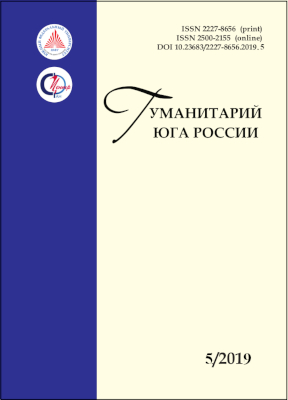Межнациональное согласие в сознании и повседневной культуре молодежи Ростовской области в контексте миграционных процессов на Юге России
Для цитирования
Артамонова Я. В., Мищенко Д. Н., Узунова О. Ю., Люев А. Х. Межнациональное согласие в сознании и повседневной культуре молодежи Ростовской области в контексте миграционных процессов на Юге России // Гуманитарий Юга России. 2019. Том 8. № 5. С. 248-259. DOI: https://doi.org/10.23683/2227-8656.2019.5.21
Аннотация
Интенсивность миграционных процессов, происходящая в поликультурных регионах, может привести к обострению межнациональных отношений. Молодежь является именно той социальной группой, которая наиболее остро реагирует на изменения социальной реальности. В данной статье дается анализ представлений молодежи Ростовской области о межнациональном согласии российского общества. На основе анализа эмпирических данных выявлено, что в структуре идентичности молодежи Ростовской области наблюдается баланс между гражданской и этнической идентичностями. В качестве доминирующих инструментов, которые способствуют поддержанию межэтнического согласия, выступают язык и культура.
Ключевые слова:
миграция, межнациональные отношения, межэтническое согласие, межэтническая напряженность, полиэтничность, моло-дежь, ценностные установки, Ростовская область, Юг России
Литература
Волков Ю.Г., Лубский А.В., Воденко К.В., Войтенко В.П., Денисова Г.С. Институциональные практики в межэтническом и межрелигиозном взаимодействии на Юге России. Междисциплинарный анализ и оценка потенциала использования в укреплении общероссийской идентичности. Ростов н/Д., 2018.
Всероссийская перепись населения 2010. Режим доступа: http://www.gks.ru/ free_doc/new_site/perepis2010/croc/perepis_itogi1612.htm.
Галактионова М.А. Роль праздничной культуры в формировании российской идентичности // Вестн. МГУКИ. 2010. № 2 (34). С. 52–57.
Денисова Г.С., Герман М.А., Денисов В.И., Сущий С.Я. Атлас демографической динамики, гражданской идентичности и межэтнических отношений в Ростовской области. Ростов н/Д.: Фонд науки и образования, 2018. 188 с.
Денисова Г.С., Лубский А.В., Войтенко В.П. Межэтнические взаимодействия на Юге России как предмет научных исследований // Гуманитарий Юга России. 2018. Т. 7, № 6. С. 41–56.
Двадцать лет реформ в России глазами жителей Ростовской области / Ю.Г. Волков, Ф.А. Барков, М.Ю. Барбашин [и др.]; отв. ред. Ю.Г. Волков. Ростов н/Д.: Антей, 2012.
Двадцать пять лет новой России: Ростовская область / отв. ред. Ю.Г. Волков. Ростов н/Д.: Фонд науки и образования, 2018. 174 с.
Дробижева Л.М. Общероссийская идентичность и уровень межнационального согласия как отражение вектора консолидационных процессов // Социологические исследования. 2017. № 1. С. 25–36.
Лубский А.В. Методология региональных исследованиий. М.: ИНФРА-М, 2019. С. 158–169.
Межнациональное согласие в общероссийском и региональном измерении. Социокультурный и религиозный контексты / отв. ред. Л.М. Дробижева. М.: ФНИСЦ РАН, 2018. 552 с.
Межнациональное согласие как ресурс консолидации российского общества / отв. ред. Л.М. Дробижева; Ин-т социологии РАН. М.: Ин-т социологии РАН, 2016. 400 с.
Межэтнические отношения и религиозная ситуация в Южном федеральном округе (по состоянию на первое полугодие 2018 года) : экспертный доклад / под общ. ред. В.А. Тишкова. Ростов н/Д.: Фонд науки и образования, 2018. 184 с.
Миграция населения в России: тенденции, проблемы, пути решения // Социальный бюллетень 2018 г. Режим доступа: http:// ac.gov.ru/publications/.
Мукомель В.И., Рыжова С.В. Доверие и недоверие в межнациональных отношениях // Социологические исследования. 2017. № 1. С. 37–46.
Российский статистический ежегодник. 2018 : стат. сб. / Росстат. М., 2018. 694 с.
Указ Президента РФ от 19.12.2012 № 1666 «О Стратегии государственной национальной политики Российской Федерации на период до 2025 года». Режим доступа: http://kremlin.ru/acts/bank/36512
Всероссийская перепись населения 2010. Режим доступа: http://www.gks.ru/ free_doc/new_site/perepis2010/croc/perepis_itogi1612.htm.
Галактионова М.А. Роль праздничной культуры в формировании российской идентичности // Вестн. МГУКИ. 2010. № 2 (34). С. 52–57.
Денисова Г.С., Герман М.А., Денисов В.И., Сущий С.Я. Атлас демографической динамики, гражданской идентичности и межэтнических отношений в Ростовской области. Ростов н/Д.: Фонд науки и образования, 2018. 188 с.
Денисова Г.С., Лубский А.В., Войтенко В.П. Межэтнические взаимодействия на Юге России как предмет научных исследований // Гуманитарий Юга России. 2018. Т. 7, № 6. С. 41–56.
Двадцать лет реформ в России глазами жителей Ростовской области / Ю.Г. Волков, Ф.А. Барков, М.Ю. Барбашин [и др.]; отв. ред. Ю.Г. Волков. Ростов н/Д.: Антей, 2012.
Двадцать пять лет новой России: Ростовская область / отв. ред. Ю.Г. Волков. Ростов н/Д.: Фонд науки и образования, 2018. 174 с.
Дробижева Л.М. Общероссийская идентичность и уровень межнационального согласия как отражение вектора консолидационных процессов // Социологические исследования. 2017. № 1. С. 25–36.
Лубский А.В. Методология региональных исследованиий. М.: ИНФРА-М, 2019. С. 158–169.
Межнациональное согласие в общероссийском и региональном измерении. Социокультурный и религиозный контексты / отв. ред. Л.М. Дробижева. М.: ФНИСЦ РАН, 2018. 552 с.
Межнациональное согласие как ресурс консолидации российского общества / отв. ред. Л.М. Дробижева; Ин-т социологии РАН. М.: Ин-т социологии РАН, 2016. 400 с.
Межэтнические отношения и религиозная ситуация в Южном федеральном округе (по состоянию на первое полугодие 2018 года) : экспертный доклад / под общ. ред. В.А. Тишкова. Ростов н/Д.: Фонд науки и образования, 2018. 184 с.
Миграция населения в России: тенденции, проблемы, пути решения // Социальный бюллетень 2018 г. Режим доступа: http:// ac.gov.ru/publications/.
Мукомель В.И., Рыжова С.В. Доверие и недоверие в межнациональных отношениях // Социологические исследования. 2017. № 1. С. 37–46.
Российский статистический ежегодник. 2018 : стат. сб. / Росстат. М., 2018. 694 с.
Указ Президента РФ от 19.12.2012 № 1666 «О Стратегии государственной национальной политики Российской Федерации на период до 2025 года». Режим доступа: http://kremlin.ru/acts/bank/36512
Форматы цитирования
Другие форматы цитирования:
APA
Артамонова, Я. В., Мищенко, Д. Н., Узунова, О. Ю., & Люев, А. Х. (2019). Межнациональное согласие в сознании и повседневной культуре молодежи Ростовской области в контексте миграционных процессов на Юге России. Гуманитарий Юга России, 8(5), 248-259. https://doi.org/10.23683/2227-8656.2019.5.21
Раздел
КУЛЬТУРА И ГЛОБАЛИЗАЦИЯ






